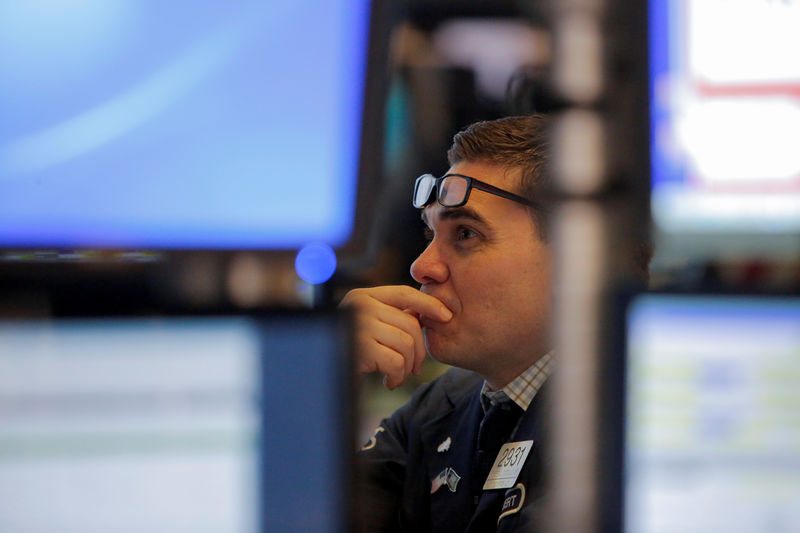Investing.com’s stocks of the week
By Geoffrey Smith
Investing.com -- The U.S. posted a new record high for Covid-19 infections, prompting Texas and Florida to pause their reopenings. ECB President Christine Lagarde said the worst of the pandemic was over in Europe but warned the recovery would be uneven. U.K. markets rose as the country abandoned its plans to quarantine people arriving from abroad. The Fed said banks could face $700 billion of loan losses from the pandemic and told them not to buy back stock for another three months. Stocks are set to open mixed, with the spreading row over Facebook (NASDAQ:FB) and its advertisers in focus. Here's what you need to know in financial markets on Friday, June 26th.
1. Fed caps bank payouts
The Federal Reserve warned that a prolonged downturn caused by the Coronavirus pandemic could leave the banking sector sitting on $700 billion of losses on bad loans.
Announcing the results of its annual stress test, the Fed said that while banks were well-enough capitalized to absorb such losses, it wanted to ensure they stayed that way.
As a result, it ordered banks not to buy back stock in the third quarter (the banks themselves chose not to buy back stock during the last three months). The Fed also capped the dividends they can pay out at the level of their average quarterly profit over the last four quarters.
Banking stocks fell in after-hours trading and are set to open between 1.2% and 2.7% lower, with Wells Fargo (NYSE:WFC) – the bank most exposed to the dividend cap as formulated – being the worst hit.
2. Record infections halt reopening
The U.S. posted 37,000 new Covid-19 cases on Thursday, a new daily record, as the outbreaks in California, Texas, Florida and Arizona continued to spread.
Texas and Florida put the reopening of their economies on hold in response to the surge in new infections of Covid-19 over the last few days. However, neither state – the second and fourth-largest in the U.S. by population – has tightened restrictions on activity yet.
Texas healthcare CEOs played down reports of local hospitals, notably in Houston, reaching their maximum capacity for intensive care, saying that there are options available to increase it. Governor Greg Abbott mandated hospitals in Harris and three other counties to postpone elective surgery to free up resources. The loss of high-margin elective surgery is increasingly cropping up as a factor hitting hospitals’ financial performance.
Elsewhere, the Trump administration asked the Supreme Court to strike down the Obama-era Affordable Care Act.
3. Stocks set to open mixed, Facebook, Amazon eyed
U.S. stock markets are set to open mixed and are still on course for a weekly loss amid fears of new restrictions on the economy to contain the virus. White House officials and state governors remain publicly opposed to a new round of lockdowns, however.
By 6:30 AM ET (1030 GMT), the Dow Jones 30 futures contract was down 55 points or 0.2%, while the S&P 500 futures contract was flat and the Nasdaq 100 futures contract was up 0.2%.
Stocks in focus later are likely to include Facebook, after Verizon (NYSE:VZ) joined a list of companies intending to boycott its social media networks in protest at its hands-off approach to hate speech and disinformation. Amazon.com (NASDAQ:AMZN) will also be of interest, after agreeing to buy autonomous driving startup Zoox for $1.2 billion.
4. Lagarde says the worst is over
European Central Bank President Christine Lagarde told an online conference that the worst of the pandemic is probably over, at least in Europe, which has reported stable infection rates for over a month since starting to lift its lockdown measure in May.
However, she warned that the recovery is likely to be uneven and ‘transformational’, noting that the pandemic could kill off companies whose businesses were already in long-term decline. European governments have generally not discriminated in handing out subsidies to all parts of their economies since March, hence Lagarde’s words imply a warning against pumping endless money into ‘zombie’ companies.
The euro was largely unchanged against the dollar at $1.1227.
The ECB said earlier that eurozone M3 money supply and bank lending grew faster than expected in May, as banks pushed out the ECB’s monetary stimulus into the real economy.
5. U.K. abandons quarantine plan
The U.K. abandoned its plan to impose a 14-day quarantine on visitors arriving from abroad as part of its strategy to tackle the coronavirus epidemic.
The government’s decision came under pressure from the travel industry, which had threatened legal action to stop the plan, which it said would cause thousands of job losses, not least across the tourism sector.
It’s the latest in a series of decisions that have shown the British government tending to relax its pandemic measures with an eye to minimizing the harm to the economy. The OECD and International Monetary Fund both expect the U.K. to be the worst-hit of all G7 economies this year.
The pound pared earlier gains to be flat against the dollar, while the FTSE 100 rose 1.6%, the best performer among major European markets on Friday.
